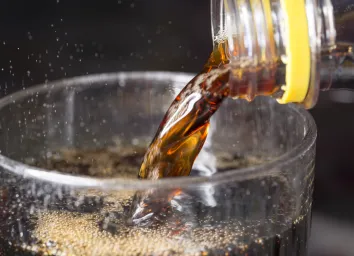What Happens To Your Brain When You Drink Soda

Soda has a deservedly bad reputation when it comes to your health. It's been implicated as a contributing factor to tooth decay, diabetes, and obesity, among numerous other health issues.
However, many people don't realize the staggering effects soda consumption may have on your brain. From your mental health to your cognition, read on to discover the effects soda can have on your brain, according to experts. And if you want to improve your diet in a hurry, check out The 7 Healthiest Foods to Eat Right Now.
Soda may increase your dementia risk.

If you want to protect your cognitive function as you age, there's no time like the present to ditch that soda habit.
"A 2017 study concluded drinking diet soda was associated with increased risk of stroke and dementia," says Holly Klamer, MS, RDN, of My Crohn's and Colitis Team, citing a study published in the journal Stroke.
In fact, the study's researchers found that, among a group of 2,888 adult participants, those who drank diet soda were nearly three times as likely to develop Alzheimer's disease compared to their counterparts who abstained.
Soda may increase your risk of stroke.

Approximately 795,000 people in the United States have a stroke each year, and the condition accounts for 1 in 6 deaths related to cardiovascular disease in the U.S. Unfortunately, drinking either diet or traditionally-sweetened soda on a regular basis can increase your risk of this often-fatal condition.
According to the aforementioned study published in Stroke, individuals who regularly drank diet soda had nearly triple the risk of stroke compared to study participants who drank none.
Additionally, a 2020 study published in the Journal of the American Heart Association found that consumption of one or more sugar-sweetened beverages a day may increase a person's risk of stroke by as much as 21%.
If you want to lower your stroke risk, check out these Foods That Help Stave Off Strokes After 40.
Soda may impact your sleep.

If you find yourself tossing and turning at night, your soda habit may be to blame.
"Due to the caffeine content in soda, sleep duration and quality can be affected," says Chris Airey, MD, medical director at telehealth clinic Optimale.
According to a 2017 study published in the journal Sleep Health, "Short sleep is associated with greater intake of sugared caffeinated sodas." However, the study's authors found no association between shorter sleep duration and diet soda.
Soda may cause memory problems.

That less-than-stellar memory you have as an adult may be related to all those sodas you downed as an adolescent.
According to a 2021 study published in the journal Translational Psychiatry, in an animal model, high sugar consumption during adolescence was associated with memory issues in later life.
"Early life sugar consumption seems to selectively impair their hippocampal learning and memory," Emily E. Noble, PhD, the study's lead author, said in a statement.
Soda may contribute to caffeine dependence.

If you find that you're sluggish, irritable, or have trouble concentrating without drinking soda, caffeine dependence may be the culprit.
"Continued consumption of caffeine found in soda can lead to chemical changes in the brain that makes you and your brain crave more. This means that you will feel like you need more soda as time goes on to feel the stimulating effects of caffeine," explains Brittany Lubeck, MS, RD, a nutritional consultant at Oh So Spotless.
For more incentive to steer clear of the sugary stuff, check out these 40 Side Effects of Drinking Too Much Soda.








